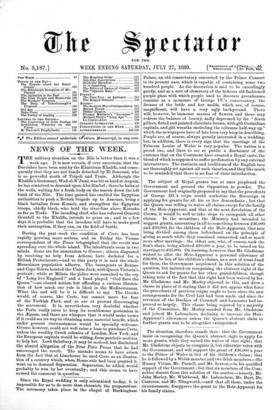The subject of Royal grants has at once perplexed the
Government and ground the Opposition to powder. The Government had originally proposed to say that the precedents of George HI.'s reign would authorise- the Sovereign in applying for grants for all his or her descendants ; but that the Queen was willing to waive all claims except for the family of the Heir-Apparent, and that at the next devolution of the Crown, it would be well to take steps to extinguish all other claims. In the meantime, the Ministry had intended to suggest grants, amounting in all to something between 236,000 and £50,000, for the children of the Heir-Apparent, that sum being divided among them beforehand on the principle of giving so much while they remained unmarried, and so much more after marriage : the eldest son, who, of course, took the lion's share, being allotted £10,000 a year, to be raised on his marriage to 225,000. On learning, however, that Mr. Gladstone wished to allot the Heir-Apparent a personal allowance of 236,000, in lieu of his children's claims, as a sort of trust-fund for them, the Government acquiesced in this solution of the question, but insisted on recognising the abstract right of the Queen to ask for grants for her other grandchildren, though taking note of the fact that this right had been waived by her. Mr. Gladstone and Mr. Morley objected to this, and drew a clause in place of it stating that it did not appear what force the precedents of previous reigns ought to have since the new arrangements for the Civil List had been made, and since the revenues of the Duchies of Cornwall and Lancaster had im- proved so largely. This clause being rejected by a majority of the Committee, Mr. Morley seceded from Mr. Gladstone and joined Mr. Labouchere, declining to increase the Heir- Apparent's allowances unless the Queen's abstract claim to further grants was to be altogether extinguished.


































